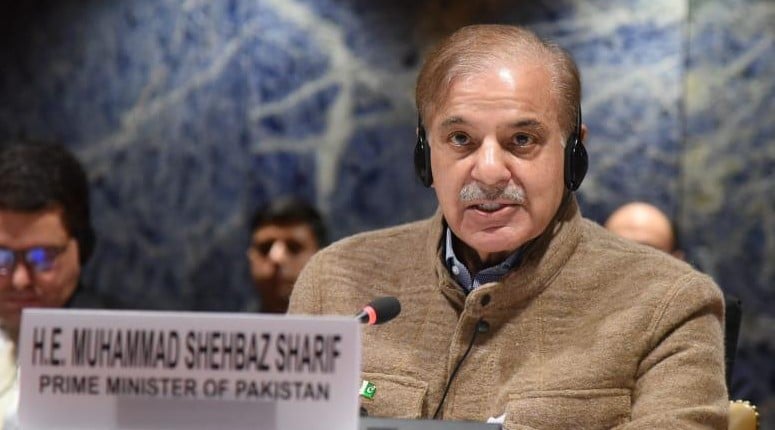Pakistan is in dire want of $8 billion from world donors during the next three years to shore up the country’s economy that was mostly laid to waste by extreme floods from June to October 2022, Prime Minister Shehbaz Sharif said in Geneva on Monday.
Officials from some 40 countries, private donors, and international financial institutions have gathered in Geneva as Islamabad seeks support in what is expected to be a major test case for who pays for climate disasters.
Last year’s floods, which are still receding, killed at least 1,700 people and displaced around 8 million.
Addressing the event, United Nations Secretary-General Antonio Guterres also appealed to the world to help Pakistan deal with the disaster caused by cataclysmic floods, saying “massive investments” are needed for the country’s rehabilitation which is expected to cost more than $16 billion.
“We must match the heroic response of the people of Pakistan with our own efforts and massive investments to strengthen their communities for the future,” Guterres said in opening remarks.
“Pakistan is doubly victimised by climate chaos and a morally bankrupt global financial system,” he added, calling for creative ways for developing countries to access debt relief and financing.
‘New lifeline needed’
At the moot, Prime Minister Shehbaz Sharif also launched the ‘Resilient Recovery, Rehabilitation, and Reconstruction Framework’ (4RF).
The framework not only outlines a vision for rehabilitation and reconstruction of the flood-affected areas but will also emphasise the need for global support and long-term partnership to implement it.
The premier called for a sustained international plan to meet the daunting task of reconstruction and rehabilitation of flood-affected areas and build a climate-resilient Pakistan.
He said a new lifeline was needed for our people to power our economy and reenter the 21st century with a future that is protected from extreme risks to human security.
The prime minister said together “we have to rebuild the lives and dreams of flood-ravaged people”.
He said the international community’s solidarity and long-term support to Pakistan at this critical juncture would make the difference between staying unprepared or facing the future with renewed hope and aspirations.
“It is about the solidarity and vision needed to ensure the world’s transition to a sustainable future not on paper but on the ground in schools, in the fields, in business, in industries and in homes.”
The Pakistani premier said his government had prepared a comprehensive framework for recovery, rehabilitation and reconstruction with resilience.
“The first part of this plan reflects priorities for recovery and reconstruction, bearing in mind the minimum funding requirement of $16.3 billion, half of which is proposed to be met from domestic resources and the other half from development partners and friends,” Shehbaz said.
He added the funding gap for minimum recovery was $8 billion which would be needed over the next three years.
“The second part of the framework incorporates flood resilience design and infrastructure projects such as protecting key highways, rail-line networks, an early warning system and capacity building for rescue and relief in future disasters,” the PM said.
He said it was clear that Pakistan’s ability to recover from the colossal flood disaster, restore critical infrastructure and revive rapid economic growth would hinge substantially on the speed of these actions.
“The most important link in this chain will be financial resourcing and if that gap continues to obstruct our recovery and minimum resilience needs, the results will be too catastrophic to imagine,” he added.
France announces $10m aid
French President Emmanuel Macron, in a video message, announced support for Pakistan —in talks with financial institutions— and said Paris would in the long term continue to provide expertise and financial support as required by Islamabad.
“France will bring a new contribution of $10 million for Pakistan aid support,” he added.
Flood-hit Pakistan
Pakistan and the United Nations are holding the conference to mobilise international support to help the country recover more effectively from the devastation caused by recent floods.
Additional funding is crucial to Pakistan amid growing concerns about its ability to pay for imports such as energy and food and to meet sovereign debt obligations abroad.
However, it is far from clear where the reconstruction money will come from, especially given the difficulties raising funds for the emergency humanitarian phase of the response which is around half funded, according to UN data.
At the COP27 meeting in Egypt in November, Pakistan was at the forefront of efforts that led to the establishment of a “loss and damage” fund to cover climate-related destruction for countries that have contributed less to global warming than wealthy ones.
However, it is not yet known if Pakistan, with a $350 billion economy, will be eligible to tap into that future funding.
Organisers say around 250 people are expected at the event including high-level government officials, private donors and international financial institutions.
Pakistan’s ambassador to the UN in Geneva, Khalil Hashmi, said Islamabad was willing to pay for about half of the bill but hoped for support from donors for the rest. “We will be mobilising international support through various means,” he said. “We look forward to working with our partners.” (Reuters)






